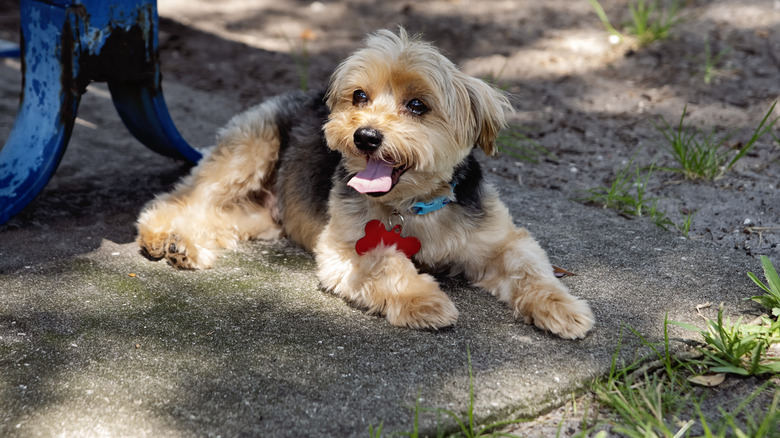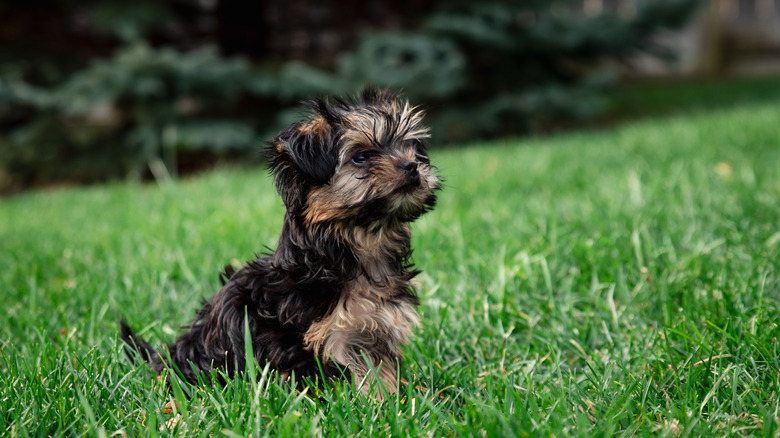Everything To Know About Morkies
The Morkie, sometimes referred to as a Morkshire terrier or a Yorktese, is a cross-breed dog that is a mix of two different breeds: a Yorkshire terrier and a Maltese. Like all mixed-breed dogs, Morkie puppies will inherit physical and behavioral traits from both parents. These types of cross-breeds are often referred to as designer breeds.
When two breeds of dogs are crossed, it is impossible to predict the outcome. A Morkie can look like a Yorkshire terrier and act like a Maltese, look like a Maltese and act like a Yorkshire terrier, or any combination in between. Every Morkie pooch is unique.
The Maltese, a small, fluffy white toy dog, has been bred as a companion and lapdog since the 19th century. They are known for their gentle and affectionate personality. The Yorkshire terrier, one of the smallest terriers, descends from a Scottish terrier and was brought to the north of England with migrants looking for work. They were mixed with other small breeds and were used as vermin killers. Their diminutive size made them easy to transport and also led to their popularity as pets. They are often described as feisty and tenacious, which are common terrier traits. These are little dogs with a big personality.
How big does a Morkie get?
The expected height of a Morkie is 6 to 8 inches, but that can vary slightly. The weight of a Morkie can range between 4 and 12 pounds. Morkies are toy dogs.
Do Morkies bark a lot?
Yes, Morkies are known as barkers. They are good natural watch dogs and will vocalize at anyone or anything they consider an intruder. Because of their intelligence and high energy, they need a lot of stimulation and the opportunity to learn appropriate behavior. Otherwise, boredom or attention-seeking barking can become an issue.
Morkies are very social dogs, and if left alone for long periods, they can bark due to frustration or anxiety. Morkies are only suitable for apartment living if barking is not an issue and if they will not be left alone for more than a few hours at a time.
Are Morkies hypoallergenic?
There is no such thing as a truly hypoallergenic dog. Because they are low-shedding dogs, Morkies produce less dander and are less likely to trigger dander allergies. Morkies should not be relied upon to be allergy safe.
Morkies are considered low-shedding dogs, as they have a single coat of hair instead of fur. Their coat is long and silky. They inherit this coat type from their parent breeds, the Maltese and Yorkshire terrier.
How to groom your Morkie
Morkies usually have a fine, silky coat that requires daily grooming to prevent mats and tangles. Grooming your dog is also essential to relationship building and health management. Establishing a regular grooming routine and working with a qualified and reputable professional groomer will help keep your Morkie's coat in great shape.
Start young
Responsible breeders will have already gotten your Morkie puppy used to some of the daily grooming and maintenance practices that will keep them happy and healthy. Morkie puppies can start getting used to a soft brush from the age of 3 weeks, and this is part of good animal husbandry and early socialization on the part of the breeder. Choose a quiet location for grooming and wait until your Morkie is calm and relaxed before trying to groom them. Teaching them to sit or stand on a nonslip mat on an elevated surface may make it easier for you but ensure that they cannot slip or jump off.
Gradually expose your Morkie to the equipment you will be using. Grooming can be very stressful for dogs with unpleasant early experiences. Always brush in the direction the hair grows to prevent discomfort.
Practice grooming little and often using rewards, patience, and positive reinforcement. If it ever seems that your puppy is not enjoying the activity, you are pushing them too quickly. Get your Morkie used to being touched all over their body during the grooming practice. Make sure they are relaxed and comfortable throughout. Morkies require daily brushing, as their hair tends to get tangled easily. Knots and mats can be extremely uncomfortable and painful for a dog. Daily brushing will keep your Morkie looking great.
Do Morkies need a lot of exercise and training?
If Morkies have plenty of mental stimulation, training, and playtime at home, they will be happy with a walk of 30 to 60 minutes daily. They are active, have a high energy level, and are playful.
Morkies, like other little dogs, can seem slow to housetrain. Take them to their toileting area frequently and give them high-value rewards every time they go. Supervise your Morkie closely so they do not get the opportunity to make mistakes until they are fully housetrained. Never use punishment as part of housetraining a Morkie, as this can make housetraining more difficult to achieve.
Morkies love and benefit from positive reinforcement training. They should be well socialized before they are 12 weeks old.
What health problems are common with Morkies?
Collapsing trachea, dental issues, hypoglycemia, and glaucoma are some of the common health problems in Morkies. Also commonly seen are reverse sneezing and weight gain. In the same way Morkies inherit their looks, size, and personality from their parent breeds, they can also inherit health issues. This is why getting a puppy from a responsible breeder is so important. You should take your Morkie for regular checkups with your veterinarian every six months. Morkies tend to have a long life span of up to 13 to 15 years old.
Morkies are prone to skin problems, so be careful not to overbathe, as this will dry their skin and make it itch. Use a mild shampoo formulated for dogs and ensure you dry them thoroughly after the bath. If you want to keep your Morkie's coat long, trim the hair in front of their eyes and around the anal opening once a week. If you know how to trim your dog's nails safely, trim them every two to four weeks. If you find bathing and nail trimming difficult, enlist the help of a professional groomer
Examine your Morkie's eyes and check their ears and paws regularly for infection. Morkies tend to have weepy eyes that need to be gently wiped daily. Like other small dog breeds, Morkies are predisposed to dental problems, so daily tooth brushing with dog toothpaste is essential. Your adult Morkie should go to the veterinarian for annual dental cleanings to properly remove any buildup of tartar under anesthesia. Ear problems are common in Morkies. If your Morkie is scratching their ears or rubbing their head on the floor or furniture or if their ears look sore or smell bad, visit your veterinarian.
What should I feed my Morkie?
Morkies should be fed a high-quality kibble diet designed for toy breeds. Purchase age-appropriate dog food and feed as directed. Frequent, small meals are recommended to avoid low blood sugar, as Morkies tend to eat very little in one sitting. Always ensure that Morkies have access to clean, fresh water.







